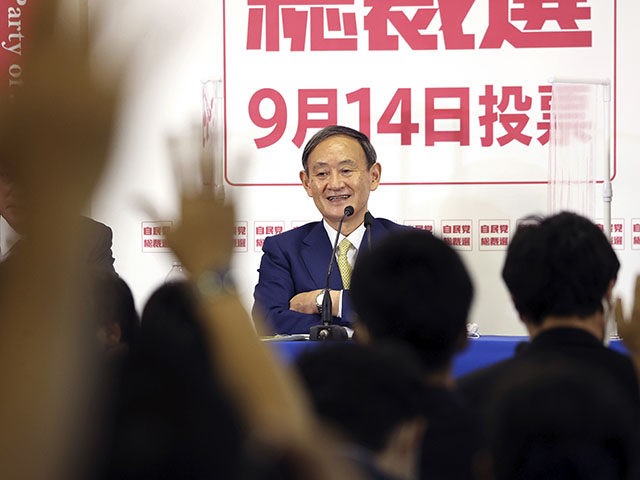Japan’s Kyodo News published a poll on Wednesday that found Chief Cabinet Secretary Suga Yoshihide to be the most popular choice to succeed Abe Shinzo as leader of the Liberal Democratic Party (LDP) and prime minister of Japan.
Suga always seemed a strong candidate on paper, but polls taken immediately after Abe’s surprise resignation announcement on August 28 favored former Defense Minister Ishiba Shigeru. Ishiba held a commanding lead in Kyodo’s first poll after Abe’s resignation with 34 percent to Suga’s 14, while LDP policy director Kishida Fumio made a strong showing in third place with 7.5 percent.
In the new Kyodo poll, Suga surged to an overwhelming 50 percent lead while Ishiba slid to 30 percent and Kishida held fairly steady at 8 percent, suggesting that many fence-sitters who were initially uncertain about Suga have decided to support him.
One of the most interesting aspects of Suga’s lead in the polls is that most respondents do not appear to support the controversial Abe policies he has pledged to continue pushing for. Nearly 60 percent of poll respondents opposed Abe and Suga’s proposals for revising the pacifist clauses in the Japanese constitution, while an equally large majority wanted changes to “Abenomics,” the retiring prime minister’s economic platform. Suga pledged on Wednesday to continue Abenomics reforms if he becomes prime minister.
“A strong economy is necessary for social welfare, national security and fiscal reform. We must first revive the economy, because only then can we push through fiscal reform,” Suga said.
The process of replacing Japan’s prime minister will happen very quickly. Suga formally announced his candidacy on Wednesday, while most of his likely rivals besides Ishiba and Kishida decided not to follow suit. The election will be held on September 14. It will be a party leadership election, not a popular vote and, on that count, Suga looks to have the contest locked down, with almost 80 percent support from LDP representatives. Since LDP holds a commanding majority in the Japanese parliament, Suga is virtually assured of becoming the next prime minister if he is named party leader.
Ishiba’s campaign hit a significant setback over the weekend when it decided to cancel its announced strategy of sending a cheerful little virtual avatar of Ishiba out to visit the digital homesteads of his supporters in the popular Nintendo videogame “Animal Crossing: New Horizons.” The plan was scuttled over concerns that it could violate the game’s rules against overt political activity.
The Associated Press described Ishiba as an Abe “rival” whose platform calls for changing Abenomics to “focus more support for small businesses and low-income earners as well as rural areas,” while Kishida “says he seeks to be a leader who listens to the people’s voices more carefully than Abe and prioritize economic policies to address disparities.”
By contrast, Suga is a “continuity candidate” seen as more popular among LDP leaders than the general public, at least until the new poll from Kyodo News. Ishiba, 63, is more youth-oriented and populist than the stolid 71-year-old Suga and more popular with younger LDP members, but he ruled out the sort of longer, broader election that he might have fared better in, stressing the importance of maintaining stability by choosing a successor to Abe quickly.
“I’ve continuously challenged Abe and I have more support than those who haven’t. This is not based on performance, but on expectations,” Ishiba said in a recent interview, suggesting he might be keeping his powder dry for a general election to come instead of pushing hard to become Abe’s immediate replacement.

COMMENTS
Please let us know if you're having issues with commenting.